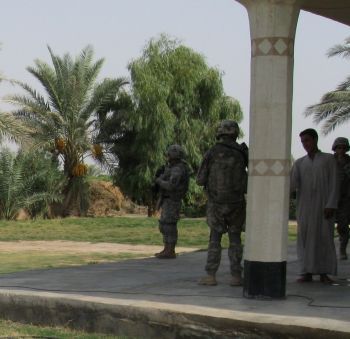
Publisher:
Bonnie King
CONTACT:
Newsroom@Salem-news.com
Advertising:
Adsales@Salem-news.com

~Truth~
~Justice~
~Peace~
TJP
Jan-09-2014 13:15

 TweetFollow @OregonNews
TweetFollow @OregonNews
Violence Threatens to Thwart Iraqi Oil Resurgence
Nicholas Cunningham for Salem-News.comThe clashes kick off 2014 in much the same way as 2013 ended – a return to violence in a country that had seen important security gains in recent years.
 Iraq in 2008. Salem-News.com photo by Tim King |
(LONDON OilPrices.com) - A wave of violence has swept parts of Iraq at the start of 2014 as the central government fights back against Al-Qaeda aligned militants in Anbar Province. The Islamic State of Iraq and the Levant (ISIL) reportedly took control of Ramadi and Fallujah, bombing police headquarters and killing dozens. On New Year's Day Prime Minister Nouri al-Maliki sent in reinforcements to take back control of AnbarProvince's two largest cities. The clashes kick off 2014 in much the same way as 2013 ended – a return to violence in a country that had seen important security gains in recent years.
Over 7,800 civilians were killed in Iraq in 2013, the bloodiest year over the past five. The latest violence occurred in Anbar Province, a region that dogged the U.S. military during its decade-long war. ISIL is also engaged in fighting Syrian President Bashar al-Assad, and the latest string of events indicates that the violence of the Syrian civil war is spreading deeper into Iraq.
The conflict has yet to affect Iraq's oil fields, and production hit 3.2 million barrels per day (bpd) in December, the most since August 2013, according to Bloomberg. To be sure, the violence does not pose an immediate threat to Iraq's oil output, as three-fourths of the country's production comes from the South, and much of the rest from Kurdistan in the North. In fact, according to the EIA, a majority of Iraq's oil production comes from three fields – Kirkuk, and the North and South Rumaila fields near Basra. The latest violence is not located near these areas.
Still, the instability and the loss of control of key cities by the Iraqi government underscores the intense security challenge facing the country as it seeks to ramp up oil production in the coming years. Iraq has a stated goal of tripling oil production to 9 million bpd by 2020. In a 2012 special report on Iraq, the IEA estimates a slightly less rosy figure of 6.1 million bpd by the end of the decade in its central scenario.
With the immense challenges facing Iraq's oil sector, even doubling today's output over the next six years looks rather ambitious. Iraq still has not agreed on a hydrocarbons law that would outline oil governance. Kurdistan is making brazen moves aimed at increasing its independence from the central government in Baghdad. This may help to boost Kurdish oil production, but political conflict between the semi-autonomous region and the Maliki government casts a shadow of uncertainty over the country's oil industry. Most importantly, however, is the violence that threatens the stability of Iraq, which is now the second largest OPEC producer after Saudi Arabia.
While Iraq's failure to meet its ambitious oil production goals may seem to be a problem solely for Iraq, oil consumers around the world may be more dependent than they realize on the oil fields of Rumaila and Kirkuk. Over the next 20 years, according to the IEA's latest World Energy Outlook, Iraq will account for the largest source of additional oil production to global markets. Yet, its failure to live up to those hopeful projections – and given the latest reports of violence, that seems entirely plausible – will send prices much higher than the 2035 price of $128 per barrel that the IEA predicts, as supply does not keep pace with demand.
Source: http://oilprice.com/Energy/
By. Nicholas Cunningham of Oilprice.com
 |
 |
 |
Articles for January 8, 2014 | Articles for January 9, 2014 | Articles for January 10, 2014
Salem-News.com:





Terms of Service | Privacy Policy
All comments and messages are approved by people and self promotional links or unacceptable comments are denied.
[Return to Top]
©2025 Salem-News.com. All opinions expressed in this article are those of the author and do not necessarily reflect those of Salem-News.com.